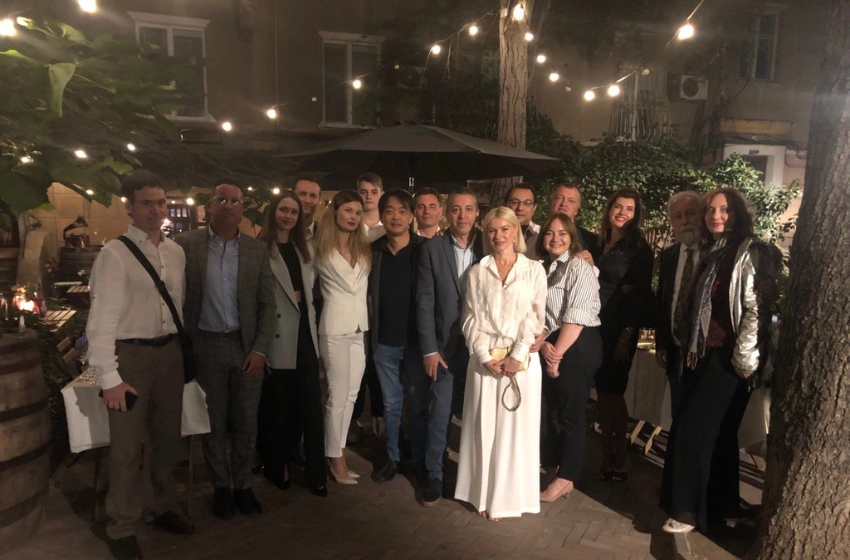Japanese conductor Hirofumi Yoshida – the Musical Director of the Pavarotti-Freni Municipal Theatre of Modena and now Principal Guest Conductor of the Odesa National Academic Opera and Ballet Theatre – conducted Puccini’s La Bohème” in Odesa on Sept. 10. He spoke with Kyiv Post about his experience.
Maestro Yoshida, this is not the first time you have come to conduct in Odesa. How did you first get together with the Odesa Opera orchestra?
JOIN US ON TELEGRAM
Follow our coverage of the war on the @Kyivpost_official.
The meeting with the Odesa Opera orchestra took place at the invitation of the music impresario Enrico Copede. It was Dec. 20, 2020, and I still remember well that it was very cold. He gave me a beautiful Cossack hat. The first encounter with the orchestra went very well and I felt great sympathy from them, but also great energy. They already played well, but then I brought the Italian style, because, even though I’m Japanese, in reality I’ve been Italianized by 20 years of living in Italy. And since I made a career in Italy, I can almost say that I’ve shed my Italian-Japanese blood in the Odesa orchestra. This is how our good relationship was born. We created a Madame Butterfly [by Giacomo Puccini], which went very well also due to the quality of the young singers. So after a month they made me an offer to become the main guest director of the theatre, which is an important recognition.

Quarter Million Without Heat and Power: Kyiv, Odesa Under Russian Attack
The appointment as Principal Guest Conductor is the starting point of a very ambitious project: the Japanese government has decided to finance a program that includes the tour of the Opera orchestra in Japan. Can you explain the meaning of this project?
We now live in the 21st century; it isn’t easy to find people who have great sensitivity and who want to support culture. But fortunately I’ve had a long career in Italy and in Japan I’m known as the only conductor who conducts opera in Italy, the homeland of opera. So in Japan it’s easier for me to find important people who can make contributions.
In Japan, we met representatives of the foreign ministry and parliament. They were very interested in the project of being able to invite the Odesa Theatre on tour to Japan, thanks to the help of the government. The Japanese government has welcomed this project and has already started the procedures to be able to carry it out in 2024, or at the beginning of 2025 at the latest. The Japanese are willing to help sending Japanese artists abroad or receiving Ukrainian artists and this pushes the Japanese government to finance various musical initiatives. For example, the Japanese embassy in Kyiv has already helped the Opera Theatre with technical stage equipment: brand new projectors with Japanese funds. Japanese national television NHK will also follow the project. In fact, they were also present at the performance of La Bohème on Sept. 10.
How is Odesa perceived in Japan? Tell us your personal anecdotes about the city.
I must reveal a secret to you: all Japanese of all generations know the name “Odessa,” thanks to a very popular manga, a typical Japanese animation whose protagonist is a robot called Gundam. In the story the enemies come from a planet called Odesa. And in the story there is also a great battle, the Apocalypse, which is the final clash with Odesa planet.
What impact does being a Japanese person, specialized in Italian opera music, conducting in Ukraine have on art, music and performance?
There are many things that I feel I have to represent: Italian musicality, which is very different from Japanese music, Ukrainian identity and, of course, my Japanese nature. But, here in Odesa I find myself in a middle ground: I am closer to the East, but at the same time, I feel a little closer to Italy than to Japan. I have been working in Italy for 20 years, and I can honestly say that it is not easy for foreign orchestras (non-Italian ones) to be able to interpret the Italian style, which is very particular. Then every composer has his own style: Rossini, Puccini, Verdi. I always try to convey all my experiences made in Italy to bring Italian musicality. Italy, Japan, Ukraine are very different creatures. However, I always try to create synergy by taking all the good points from all sides.
There is an urban legend that the Odesa Theatre has always had an Italian repertoire and therefore Odesa musicians are more familiar with Italian music than with German or Russian music.
Yes, I can confirm that. But I only came three years ago and I have never heard how they play German or Russian music. For example, I heard them performing the La Forza del Destino [by Giuseppe Verdi] as well as La Gazza Ladra [Gioachino Rossini] and I felt that they have the right sensitivity. So, I can definitely say that they have this tradition and really know the Italian repertoire.
You can also highlight the text and press Ctrl + Enter












